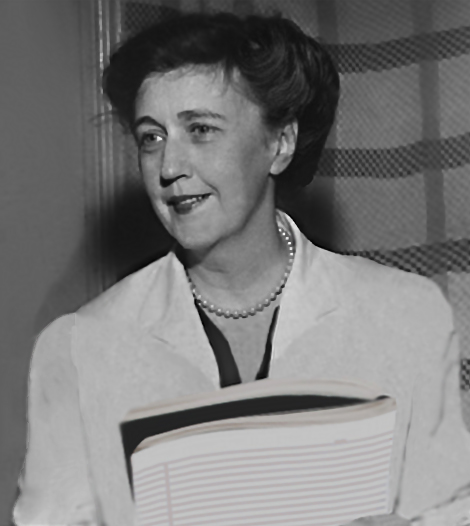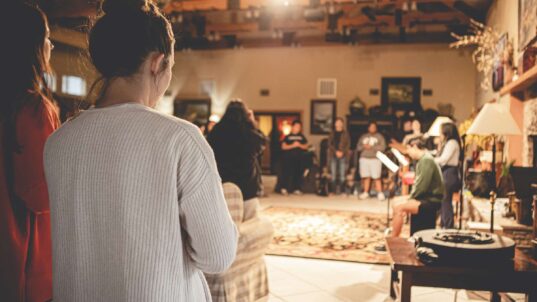
Virginia Durr, by Times-Dispatch, public domain image via wikimedia
In 1903 Virginia Durr was born in Birmingham, Alabama. While she, as a White woman, grew up under the care of an African-American nanny, she was also raised to believe in the racial superiority of Whites. One of her grandfathers was a former enslaver and the other was a member of the Ku Klux Klan, an organization she and her family deemed essential for the protection of the White way of life. It wasn’t until she attended Wellesley College that she began to challenge her own racist beliefs. The dining halls required that students sit with different classmates for each meal. Virginia rebelled against this policy, but a threat of expulsion led to her reluctant acceptance of dining with students whose skin color was different from hers.
Virginia returned to Birmingham when she no longer had the funds to attend Wellesley. Three years later she was married and settled into being a wife and social figure. It was her social volunteering where she became acquainted with civil rights activists and the plight of those for whom they were advocating.
When her husband was appointed to a position in the administration of Franklin Roosevelt, Virginia’s own activism began to flourish. She became one of the founding members of the Southern Conference for Human Welfare (SCHW), a group formed to reduce segregation and improve the lives of African Americans in the South. She became a friend of Eleanor Roosevelt and worked to pass legislation to eliminate the poll taxes.
When her husband’s career called them back to Montgomery, Virginia took on a more grassroots role in the civil rights movement. She housed civil rights volunteers when they came to Montgomery. She became a friend of Rosa Parks. She was the source of funds to bail Rosa Parks out of jail when Rosa refused to give up her bus seat. She helped Rosa’s family through the tough times they faced. Later, she supported Rosa with a scholarship to attend school.
When the Selma to Montgomery march was being planned, Virginia housed and fed many of the volunteers. She became vocal in actively promoting many of the critical civil rights issues such as voting rights. Her activism continued into her 90s. She died in 1999 at the age of 95.
Just imagine how a woman of privilege changed her views and beliefs about social justice and democracy. A genuine democracy can’t exist if a group (or groups) of people are excluded from full and equal participation in it. Virginia’s work to undo segregation and expand democratic participation was work to grow democracy in the U.S. This work started with a transition in her consciousness. Our consciousness can be greatly affected by direct contact with those different from ourselves. A publicity campaign, an eloquent speech, a call for justice, or any other remote experience cannot have quite the impact that actually sitting across the table can have. Virginia Durr was shaped by direct experiences with those experiencing injustice. Just imagine how we might create more of these experiences to help us move toward being a more just democratic society.
* * *
“Her courage, outspokenness, and steely conviction in the earliest days of the civil rights movement helped change this nation forever.” – President Bill Clinton speaking upon the death of Virginia Durr
This is part of our “Just Imagine” series of occasional posts, inviting you to join us in imagining positive possibilities for a citizen-centered democracy.


